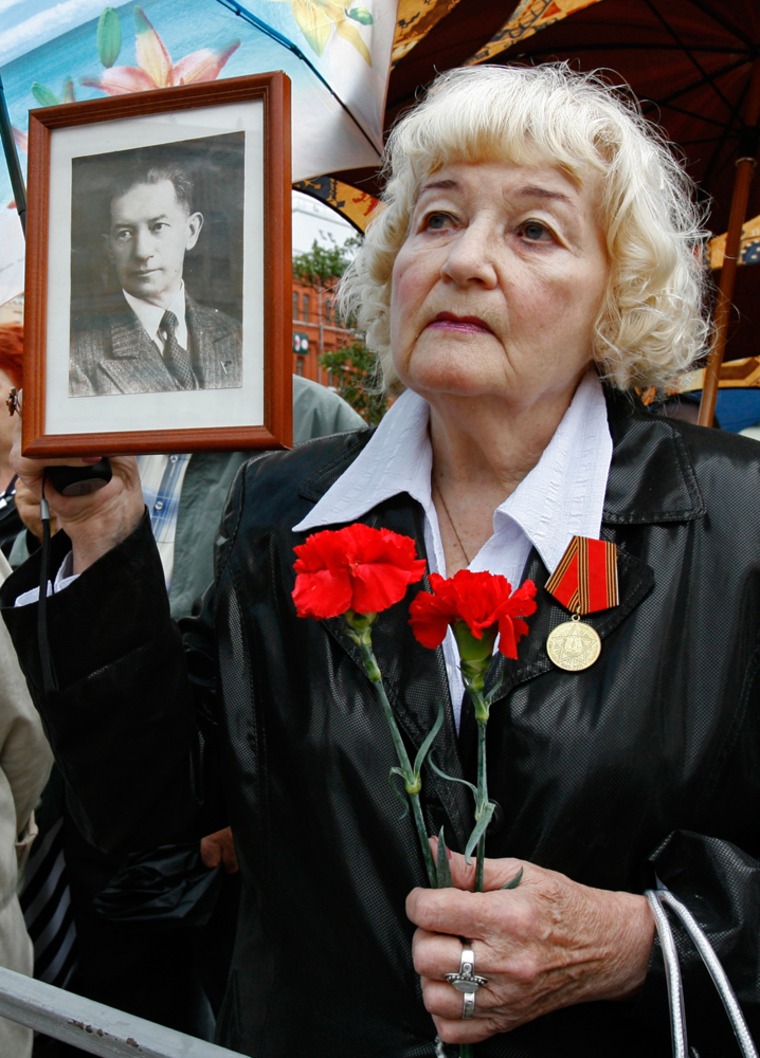Now in their 70s and 80s, children of the victims of Joseph Stalin’s political repressions remembered one of the darkest pages of Russia’s history at a ceremony Wednesday in central Moscow.
Several hundred people laid flowers and lit candles to honor the victims of the Great Purge of 1937, when millions were labeled “enemies of the state” and executed without trial or sent to labor camps.
The 70th anniversary comes as the Kremlin, focused on restoring Russians’ pride in their Soviet-era history, has been trying to soften public perception of Stalin’s rule and hushing up the full horror of his crimes.
“Those who call for that are those who have never experienced themselves the hunger, cold and humiliation that we had to go through,” said Irina Kalina, 79, who was among those gathered on a square outside what was once KGB headquarters and is now the headquarters of its successor agency, the FSB.
She held several red carnations and a framed photograph of her father, Ignaty Kalina, who was serving as foreign minister of the Belarus Soviet republic when he was arrested in 1938 and accused of being a spy. He died in jail several months later. Kalina was sent to a labor camp in Kazakhstan for five years.
Going back to roots?
President Vladimir Putin said last month that although the 1937 purge was one of the most notorious episodes of the Stalin era, no one should try to make Russia feel guilty about it because “in other countries even worse things happened.”
Putin, who was speaking to a gathering of history teachers, suggested the United States’ use of atomic weapons against Japan at the end of World War II was worse.
The government in recent years has tried to control how history is taught, publishing Kremlin-approved textbooks and getting rid of those that deviate from the new official line. In 2003, authorities banned a history text that was critical of Stalin’s tyrannical rule and included an assignment to ask students to discuss whether Putin could be considered an autocrat.
“Our authorities in many respects are going back to the norms of Soviet times,” said historian Nikita Sokolov. “For them history ... is a tool for bringing up a patriotic citizen, someone who is ready to love this government at any price.”
He said there are various history textbooks currently in use, including some that give a frank assessment of Stalin’s rule, but “everything depends on how teachers interpret them.”
“They are getting new signals these days: Stalin is now being excused and elevated, and they will not go against the official line,” said Sokolov, who co-authored a book about various ways to interpret the past.
Slave labor camps, show trials
Political arrests on dubious charges were common throughout Stalin’s rule, resulting in the execution of hundreds of thousands of Russians. Millions more became inmates of the gulag, the system of thousands of slave labor camps.
Large-scale arrests of Communist Party members began in 1934 and seemed to reach a crescendo in 1936-37, when a series of show trials was held in Moscow featuring dramatic courtroom confessions.
Russia has never sought to bring to justice KGB officials implicated in human rights abuses committed during the Communist era. Putin, a proud alumnus of the KGB, headed the FSB in the late 1990s.
